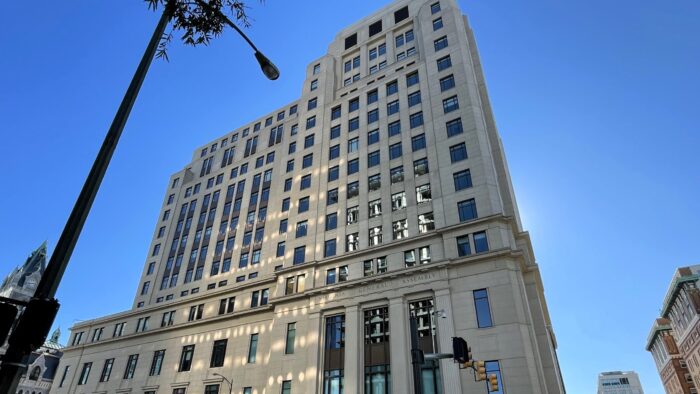
The General Assembly Building as viewed from Broad Street. (BizSense file images)
State-level attempts to address tax collection issues that have plagued Richmond restaurant owners in particular have apparently fizzled out in this year’s General Assembly session, leaving city government to make what fixes it can on its own.
Two bills on the issue that had passed the House of Delegates and crossed over to the Senate were effectively killed this week by the Senate Finance and Appropriations Committee, a majority of which had previously balked at a Senate version of one of the bills.
On Tuesday, the committee was unanimous in voting that the bills be passed by indefinitely, leaving them out of the state budget bill that the two chambers are hashing out.

The Richmond City Hall building.
The bills’ defeat leaves any immediate fixes to Richmond’s tax collection practices and policies to City Hall, which has started taking steps toward achieving proposed changes in how taxes are collected and penalties are applied.
The internal changes were proposed in response to a wave of media coverage and complaints from Richmond restaurant owners who reported being hit with high tax bills because of unknown late fees and interest charges accruing over time.
Earlier this month, City Council approved an ordinance amending city code to allow tax payments to be applied to the month they are made, rather than applying them first to delinquent balances as is required by a state law.
The practice has resulted in a snowball effect in which tax payments are put toward unknown penalties, leaving only part of the balance paid and racking up additional penalties without notice to the taxpayer.
One of the two defeated bills, House Bill 1483, would have allowed Richmond and other cities to apply meals tax payments to the tax returns they accompany, rather than to delinquent accounts first.
But senators on the finance committee were cool to the idea of a statewide fix to what they considered a problem specific to Richmond. Sen. Creigh Deeds, D-Charlottesville, who led both of the committee’s votes against the bill, said in the first go-round that “localities have the ability to fix this problem.”

Sen. Creigh Deeds during a hearing this month.
“This is going to affect one type of government, and I just don’t think it’s good policy,” he said.
The other bill, H.B. 1535, would have updated state law to allow discretion on the application of a seller’s commission for businesses that collect meals taxes. The commission allows businesses to keep a percentage of the meals taxes they collect to cover credit card processing fees used in collecting that tax, but only if their accounts are in “good standing” with the city.
That bill had been requested by city administrators, who said the “good standing” requirement had contributed to restaurants’ high delinquent tax bills.
While that request is no longer going forward, the city has laid out a plan for moving forward with other changes, including reducing late-payment penalties from 10% to 2% for the first month an account is delinquent, and holding off the 10% interest charges until the following month.
Other proposed changes include electronic bill payment options, removing convenience fees for payments made using a credit card, extending payment plans from five years to six years, offering different repayment terms for individuals and businesses, and lowering the minimum down payment required to enter a payment plan.

Richmond CAO Lincoln Saunders discussed the proposed tax policy changes with restaurant owners earlier this month.
The city has started reviewing affected accounts, which Chief Administrative Officer Lincoln Saunders has said total about 500. On Monday, the city announced it is freezing penalties and interest on delinquent accounts that are under review, with a goal of completing all reviews by July 1.
Taxpayers whose accounts are delinquent as of March 1 (today) will receive notice by mail that their account is under review, according to the announcement. Those businesses will remain required to collect and remit monthly meals taxes in the meantime.
H.B. 1483 was supported by the Virginia Restaurant Association, a Richmond-based group that has demanded that the city pay back the penalties and interest to affected restaurants. Mike Byrne, the group’s executive director, said Thursday that the changes being made by the city are making up for the bills’ defeat in the Senate.

About three dozen restaurant owners and supporters gathered for a press conference about the bills earlier this month.
“Where it stands is if you make a payment to the city, they changed the code that it goes to the month that you allocate that payment for, which was the intent of both pieces of legislation in the General Assembly,” Byrne said. “At the end of the day we still kind of got what we want, but we got it from the city, surprisingly enough, and not from the state.”
Byrne and Kyle Wingfield, a Williams Mullen attorney who helped draft the legislation, said the group would consider reworking the proposals and pursuing them again in next year’s session. Byrne added that they continue to call on the city to repay affected restaurants and forgive debts caused by the issue.
“We’re trying to work out what the next step is, because the meals tax penalty and interest have to be forgiven. The people need to be given their money back,” he said.
